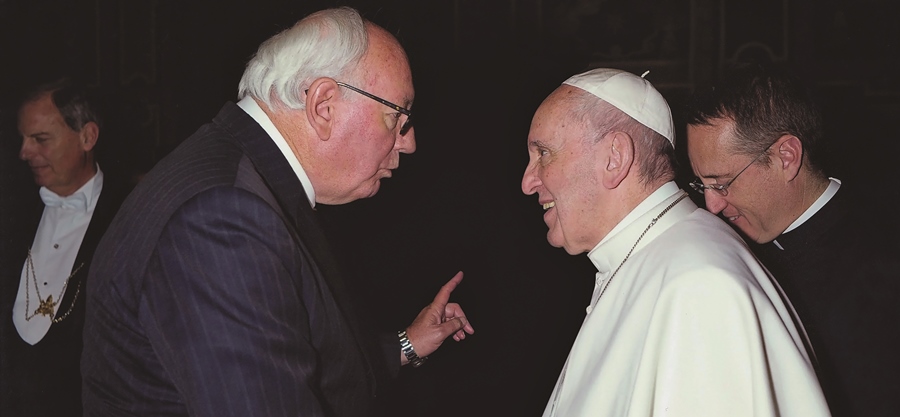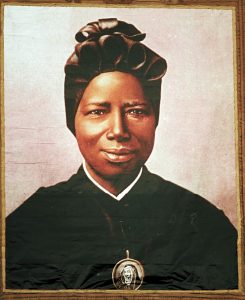By Jordan Grantham, Catholic Outlook, March 2017
John McCarthy QC, Australia’s Ambassador to the Holy See from 2012-16, met with Catholic Outlook for an interview that will form the basis of a series about the scope and impact of the work of the Australian Embassy to the Holy See.
The articles will explore with former Ambassador McCarthy how Australia is able to promote its specific issues and interests among the extensive international network and activities of the Holy See.
“The Holy See is widely regarded as the world’s most influential exponent of soft (non-military) power,” he said.
The embassy represents the Australian Government in vital areas such as human rights, religious freedom, cultural exchanges and bilateral relations. This article focuses on efforts to combat modern slavery and human trafficking, within the realm of human rights.
An important moment for Australia and for the worldwide campaign against modern slavery and human trafficking came about on 2 December 2014, when Pope Francis and global leaders of other major religions met in Rome and signed the historic Joint Declaration of Religious Leaders Against Modern Slavery.
Those who joined the Pope and signed the declaration included other important leaders representing the Anglican and Orthodox communions, Shia and Sunni Islam, Buddhism and Hinduism.
Ambassador McCarthy assisted Australian mining magnate Andrew Forrest, and his Walk Free Foundation, which has become a major anti-slavery organisation based in Australia and a principal partner with the Vatican in sponsoring the Rome meeting.
In 2016, then Ambassador McCarthy was centrally involved with submissions to the Holy See which led to the announcement by Cardinal Pell, Prefect of the Secretariat for the Economy, that the Holy See would slavery proof its supply lines.
This was one of many anti-slavery issues in which Mr McCarthy worked closely with Monsignor Sanchez Sorondo, Chancellor of the Pontifical Academies and a close associate of Pope Francis, on anti-slavery issues.
The former Ambassador also had strong connections with Sr Eugenia Bonetti MC, the long-time principal spokesperson for women religious working to rescue trafficked women and girls in Italy.
“Other good news is that many of the world’s largest food providers have also committed to slavery proofing their supply chains,” Mr McCarthy said in relation to the announcement by Cardinal Pell.
“Conferences and programs for the eradication of modern slavery and human trafficking were central parts of my work as Ambassador to the Holy See.
“The eradication of slavery has been a constant demand by Pope Francis since the start of his pontificate. He has made this a priority international objective.
“There is widespread recognition of the central role of Pope Francis in having this crucial objective embedded in the Sustainable Development Goals (SDGs) in 2015,” Mr McCarthy said.
The inspiring goal of 8.7 in the SDGs is to: “Take immediate and effective measures to eradicate forced labour, end modern slavery and human trafficking and secure the prohibition and elimination of the worst forms of child labour, including recruitment and use of child soldiers, and by 2025 end child labour in all its forms.”
Modern slavery is characterised by forced labour, marriage and dangerous working conditions, as reported in Social Justice Series Paper No 79.
The paper’s co-author Sr Noelene Simmons SM spoke at the local launch in the Diocese of Parramatta on 8 February and was introduced by Most Rev Vincent Long OFM Conv, Bishop of Parramatta and Chairman of the Australian Catholic Social Justice Council.
The report states: “In 2015, Australia was a signatory to the United Nations 2030 Sustainable Development Agenda. Three targets within this agenda refer to the elimination of human trafficking. Australian Catholic Religious Against Trafficking in Humans (ACRATH) will continue to advocate for the realisation of these targets.”
Since his return to Australia, Mr McCarthy has continued working to eradicate modern slavery and human trafficking.
In January this year, he addressed the Global Foundation in Rome, a forum to promote the common good among corporations and governments, on the priority of this issue in the Sustainable Development Goals (SDGs) of the UN, which were adopted unanimously in 2015.
In his address to the Global Foundation, Mr McCarthy emphasised the practicalities of funding the SDGs. He also made reference to the Pope’s visit to the UN in September 2015.
“The Pope also urged the UN and its member countries that an objective of the SDGs was ‘to enable these real men and women to escape from extreme poverty, we must allow them to be dignified agents of their own destiny,’” Mr McCarthy said.
“Pope Francis has said many times that those chained in modern slavery can only have a destiny if the chains are broken and they have freedom.”
This requires that Catholics and all people of good will pray, educate each other and use their resources ethically. Catholic communities can also plan commemorations for the feast day of St Bakhita, a former African slave, on 8 February.
The Social Justice Series Paper urges ongoing campaign action, especially on St Bakhita’s feast day, which was chosen by Pope Francis as the world day of prayer, reflection and action against human trafficking.









